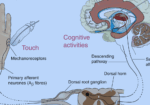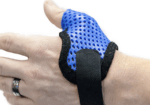DRUJ Instability and Hand Therapy Interventions
The distal radial ulnar joint (DRUJ) is the joint consisting of the distal radius and ulna which is held together by the ligamentous structure known as the TFC. DRUJ instability can be acute or chronic in nature. An acute injury is usually addressed by placing the patient in a long-arm cast for 6 weeks. In chronic cases, this becomes a much more complex issue and the severity depends on the reason for the chronic instability.

Conservative management of chronic DRUJ instability is often times the first line of treatment as the surgical procedures can be invasive and outcomes can vary. If an individual is very active surgical intervention is more likely to be indicated. However, a trial of therapy can be beneficial in determining if surgical intervention is needed to repair the DRUJ injury.
Functional Splinting
Conservative DRUJ injury treatment typically consists of functional bracing and is often key to successful management. You can test the stability of the joint by first applying a dorsal pressure over the ulna and a volar force on the radius. While holding the pressure over the ulna and radius, take the patient through forearm rotation. If the patient reports less pain, this is an indication they should be splinted with a dorsal pressure over the ulna and volar pressure over the radius. However, if this causes more pain, the opposite should be tested. A volar pressure should be placed over the ulna and a dorsal pressure over the radius. If there is no pain with forearm rotation, then splinting should replicate the pressure.
Therapy Interventions
When treating these patients it is very important to respect their pain as well as avoid exacerbating the symptoms. Yes, the structures can be stressed to facilitate healing however it is important to manage the stress in a slow controlled manner. Therefore having an understanding of the instability pattern and stage of injury is key to DRUJ injury treatment. It is important to keep exercises simple, once they can be performed within a pain-free range advance the patient to more challenging exercises.
Common DRUJ Injury Treatment Interventions
- Edema management techniques
- Contrast bathes for managing inflammation and pain
- Pain-free range of motion including forearm rotation, if this is painful the functional splint can be utilized while performing ROM. If still painful can begin range of motion in the dart-thrower plane.
- Isometric strengthening of PQ and ECU
- Proprioceptive exercises advance from the joint position in space with replication to more advanced activities such as tossing a ball/disc stacker

- Once again only advance the patient if they are tolerating well and there are no exacerbation of symptoms can continue to advance with all exercises.
Treating DRUJ instability is tricky and varies based on the extent of the pathology.
Zhiqing, C. (2018) A novel staged wrist sensorimotor rehabilitation program for a patient with triangular fibrocartilage complex injury: A case report. Journal of Hand Therapy, 32, 525-533.
https://www.jhandtherapy.org/article/S0894-1130(17)30404-0/fulltext
More To Read
Peripheral nerve injury: A hand therapist’s assessment of sensory return.
Sensory return after a hand injury specifically a peripheral nerve injury After a peripheral nerve injury, there are often times impairments in sensory function and/or motor function. The rate of recovery varies based on the degree of injury, the overall health of the patient, and the patient’s age. After an injury, it is important…
Functional Home Exercises for Patients with Wrist Instability
Functional Home Exercises for Patients with Wrist Instability Ever wondered what brushing your teeth, dressing, making a U-turn, and playing sports have in common? They all rely on a stable wrist. Wrist stability is crucial for everyday activities, supporting wrist proprioception, coordination, motor control, stability, and mobility (Wietlisbach, 2019). For patients recovering from a wrist…
Effectiveness of Conservative Therapy and Splinting for 1st CMC OA
Tsehaie, J., Sprekraijse, K., Wouters, R., Slijper, H., Feitz, R., Hovious, S., & Selles, R. (2018). Outcome of a Hand Orthosis and Hand Therapy for Carpometacarpal Osteoarthritis in Daily Practice: A Prospective Cohort Study. American Society for Surgery of the Hand, 1-11. The skinny: Non-surgical approaches (hand therapy & orthotics) are typically the go-to for…
Hand Therapy: How to Treat the Client with a New Distal Radius Fracture
A short blog post on the basics of treating a Distal Radius Fracture.
Sign-up to Get Updates Straight to Your Inbox!
Sign up with us and we will send you regular blog posts on everything hand therapy, notices every time we upload new videos and tutorials, along with handout, protocols, and other useful information.






